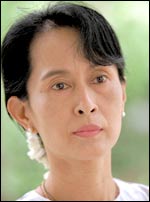Myanmar pro-democracy leader Aung San Suu Kyi spent her 58th birthday on Thursday oblivious to the diplomatic ruckus her detention by the country's military rulers has sparked.
While the junta has held Nobel laureate Suu Kyi virtually incommunicado at an undisclosed location since a May 30 clash between her supporters and a pro-junta group, the European Union and the United States have threatened more economic sanctions.
But the reaction of its Asian neighbours is more likely to worry ruling generals in Myanmar, formerly called Burma.
This week the region's main political group, the Association of Southeast Asian Nations (ASEAN), broke with three decades of tradition to criticise one of its own, with foreign ministers saying they wanted Suu Kyi freed soon.
Those neighbours are under mounting pressure from Washington.
"Together, we must tell the Burmese leaders to free Aung San Suu Kyi, to free her supporters, and to free the people of Burma," US Secretary of State Colin Powell told a gathering of foreign ministers in Cambodia on Wednesday.
Myanmar Foreign Minister Win Aung, also in Cambodia for the ASEAN meeting, said Suu Kyi would be freed but did not say when.
"Of course when I go back home (I) will take with me the...concerns expressed by other ministers during the meeting and will submit to my leadership what I have heard," he said in an interview with CNN broadcast on Thursday.
But as Suu Kyi knows after spending seven of the last 14 years confined by the junta to Buddhist meditation and playing piano at her lakeside house in central Yangon, international pressure has so far failed to bring change in the country.

The army has ruled the country since a 1962 coup, ignored a 1990 landslide election victory by Suu Kyi's National League for Democracy and kept hundreds of activists imprisoned for a decade.
"It's important that Burma gets the message from ASEAN that it's not business as usual," a Western diplomat said. "But they haven't been very receptive to what has been said before."
UN envoy Razali Ismail, who was instrumental in persuading the junta to free Suu Kyi from her last spell of house arrest in May 2002, is the only outsider to have seen her since May 30.
He left Yangon last week saying Suu Kyi was in good spirits, and had not been injured in the violence that erupted at the end of a tour to central and northern Myanmar.
Dissidents and some diplomats say a group of pro-junta youths, wielding bamboo and iron rods, set upon Suu Kyi's convoy and local villagers, killing at least 70. The government says four people died in the clash.
During the trip Suu Kyi, the daughter of independence hero Aung San, drew large crowds, to the irritation of the junta.
"I thought people would do something because Suu Kyi was attacked," said Aung Zaw, editor of a Thai-based magazine set up by Myanmar exiles. "But the people I've spoken to in Burma are so afraid. They just ask, 'who outside will help us'."
Pressure from China, a major supplier of arms to Myanmar's junta, is key to any change in the country. But diplomats say this is unlikely to happen because of Beijing's ambitions to channel trade from southern China through Myanmar seaports.
"Our stance is that all things that happen in Myanmar is the internal affair of Myanmar itself," China's ambassador to Myanmar Li Gin-Jun said.
Western diplomats in Yangon see little chance for change in Myanmar. "I think if sections of the regime organised an ambush on the leader of the opposition, the chances of dialogue have considerably regressed," said the Western diplomat.






